- Home
- Kristin Harmel
The Sweetness of Forgetting Page 2
The Sweetness of Forgetting Read online
Page 2
I mentally curse Rob. He seems to have made it his personal mission to undermine everything I say.
“Well, I’m telling you it’s not,” I say firmly. “So get in the bathroom and wipe it off.”
“No,” Annie says. She puts her hands on her hips defiantly. She glares at me, not yet realizing that she’s streaked red velvet batter on her jeans. I’m sure that’ll be my fault too when she figures it out.
“This isn’t up for debate, Annie,” I say. “Do it now, or you’re grounded.”
I hear the coldness in my voice, and it reminds me of my mother. For a minute, I hate myself, but I stare Annie down, unblinking.
She looks away first. “Whatever!” She rips her apron off and throws it on the floor. “I shouldn’t even be working here!” she yells, throwing her hands in the air. “It’s against child labor laws!”
I roll my eyes. We’ve had this discussion ten thousand times. She’s not technically working for a paycheck; this is our family business, and I expect her to help out, just like I helped my mom when I was a kid, just like my mom helped my grandmother. “I’m not explaining this to you again, Annie,” I say tightly. “Would you rather mow the lawn and do all the chores around the house?”
She stalks out, presumably heading for the bathroom on the other side of the double doors. “I hate you!” she yells back at me as she disappears.
The words hit me like a dagger to the heart, even though I remember screaming them at my own mother when I was Annie’s age.
“Yeah,” I mutter, picking up the bowl of batter and the wooden spoon she left on the counter. “What else is new?”
By seven thirty, when Annie is about to leave to walk the four blocks to Sea Breeze Junior High, all of the pastries are out and the shop is full of regulars. In the oven is a fresh batch of our Rose’s Strudel, filled with apples, almonds, raisins, candied orange peel, and cinnamon, and the scent is wafting comfortingly through the bakery. Kay Sullivan and Barbara Koontz, the two eightysomething widows who live across the street, are gazing out the window, deep in conversation, while they sip coffee at the table closest to the door. Gavin Keyes, whom I’d hired to help me make my mother’s house livable again over the summer, is at the table beside them, sipping coffee, eating an éclair and reading a copy of the Cape Cod Times. Derek Walls, a widowed dad who lives on the beach, is here with his twin four-year-olds, Jay and Merri, each of whom is licking the icing off a vanilla cupcake, even though it’s only breakfast time. And Emma Thomas, the fiftysomething hospice nurse who’d tended to my mom while she was dying, is standing at the counter, trying to choose a pastry to have with her tea.
I’m just about to pack up a to-go blueberry muffin for Emma when Annie strides past me, her coat on and her backpack slung over one shoulder. I reach out and grab her arm before she can get by.
“Let me see your face,” I say.
“No,” she mumbles, looking down.
“Annie!”
“Whatever,” she mutters. She looks up, and I see that she’s put on a fresh coat of mascara and reapplied the hideous lipstick. She also appears to have added a layer of fuchsia blush that comes nowhere near the apples of her cheeks.
“Wipe it off, Annie,” I say. “Now. And leave the makeup here.”
“You can’t take it from me,” she retorts. “I bought it with my own money.”
I glance around and realize that the shop has fallen silent, except for Jay and Merri chattering in the corner. Gavin’s looking at me with concern, and the old ladies near the door are just staring. I feel suddenly embarrassed. I know I already seem like the town failure for letting my marriage to Rob end; everyone thinks he’s perfect and I was lucky to marry him in the first place. Now I appear to be a failure at parenting too.
“Annie,” I say through gritted teeth. “Do it now. And this time, you are grounded, for disobeying me.”
“I’m staying with Dad for the next few days,” she shoots back, smirking at me. “You can’t ground me. Remember? You don’t live there anymore.”
I swallow hard. I won’t let her know that her words have hurt me. “Fantastic,” I say brightly. “You’re grounded from the moment you step into my house.”
She curses under her breath, glances around, and seems to realize that everyone’s looking at her. “Whatever,” she mutters as she heads for the bathroom.
I exhale and turn back to Emma. “I’m sorry,” I say. I realize my hands are shaking as I reach for her pastry again.
“Honey, I raised three girls,” she says. “Don’t worry. It gets better.”
She pays and leaves, then I watch as Mrs. Koontz and Mrs. Sullivan, who have been coming here since the bakery opened sixty years ago, get up and hobble out the door, each of them using a cane. Derek and the twins are getting ready to go too, so I come out from behind the counter to pick up their plates. I help button Merri’s jacket, while Derek zips Jay’s. Merri thanks me for the cupcake, and I wave as they leave.
Annie emerges from the bathroom a minute later, her face blissfully makeup free. She slams a mascara tube, a lipstick, and a pot of blush down on one of the tables and glowers at me. “There. Happy?” she asks.
“Overjoyed,” I say dryly.
She stands there for a moment, looking like she wants to say something. I’m steeling myself for some sort of sarcastic insult, so I’m surprised when all she says is, “Who’s Leona, anyway?”
“Leona?” I search my memory but come up empty. “I don’t know. Why? Where’d you hear that name?”
“Mamie,” she says. “She keeps, like, calling me that. And it seems to, like, make her real sad.”
I’m startled. “You’ve been going to see Mamie?” After my mother died two years ago, we’d had to move my grandmother into a memory care home; her dementia had rapidly taken a turn for the worse.
“Yeah,” Annie says. “So?”
“I . . . I just didn’t know you were doing that.”
“Someone has to,” she spits back.
I’m sure the guilt plays across my face, because Annie looks triumphant.
“I’m busy with the bakery, Annie,” I say.
“Yeah, well, I find the time,” she says. “Maybe if you were spending less time with Matt Hines, you could spend more time with Mamie.”
“Nothing is going on with Matt.” I’m suddenly acutely conscious of Gavin sitting a few feet away, and I can feel my cheeks turning warm. The last thing I need is the whole town knowing my business. Or lack of business, as the case may be.
“Whatever,” Annie says, rolling her eyes. “Anyway, at least Mamie loves me. She tells me all the time.”
She smirks at me, and I know that I’m supposed to say Honey, I love you too, or Your dad and I love you very much, or something along those lines. Isn’t that what a good mother would do? Instead, because I’m a horrible mother, what comes out of my mouth is “Yeah? Well, it sounds to me like she’s saying ‘I love you’ to someone named Leona.”
Annie’s jaw drops, and she stares at me for a minute. I want to reach out, pull her into a hug and say I’m sorry, I didn’t mean it. But before I have a chance, she whirls on her heel and strides out of the store, but not before I see the tears glistening at the corners of her eyes. She doesn’t look back.
My heart aches as I stare in the direction she disappeared. I sink into one of the chairs the twins vacated a few minutes earlier and put my head in my hands. I’m failing at everything, but most of all at connecting with the people I love.
I don’t realize Gavin Keyes is standing above me until I feel his hand on my shoulder. I jerk my head up, startled, and find myself staring directly at a small hole in the thigh of his faded jeans. For an instant, I have the strangest urge to offer to mend it, but that’s ridiculous; I’m no better at using a needle and thread than I am at being a mother or staying married. I shake my head and pull my eyes upward, over his blue plaid flannel shirt to his face, which is marked by a thick shadow of dark stubble across his strong jaw. His thic
k shock of dark hair looks like it hasn’t been combed in days, but instead of making him look unkempt, it makes him look really good in a way that makes me uneasy. His dimples, as he smiles gently at me, remind me just how young he is. Twenty-eight, I think, or maybe twenty-nine. I feel suddenly ancient, although I’m only seven or eight years older. What would it be like to be that young, with no real responsibilities, no preteen daughter who hates you, no failing business to save?
“Don’t beat yourself up,” he says. He pats me on the back and clears his throat. “She loves you, Hope. You’re a good mom.”
“Yeah, uh, thanks,” I say, avoiding his eye. Sure, we’d seen each other nearly every day during the months he was working on my house, and when I returned home from work in the afternoons, I often fixed us lemonade and sat on the porch with him, doing my best to avoid looking at the tanned swell of his biceps. But he doesn’t know me. Not really. Certainly not well enough to judge me as a mother. If he knew me that well, he’d know what a failure I am.
He pats me awkwardly again. “I mean it,” he says.
Then he too is gone, leaving me all alone in my giant pink cupcake, which suddenly feels very bitter.
Chapter Two
I close the bakery early that day to run a few errands. Although the sun hasn’t set yet when I get home at six fifteen, it feels dark and depressing inside the cottage I’m trying hard to think of as my own.
The silence inside is deafening. Up until last year, when Rob surprised me just before Christmas by announcing he wanted a divorce, I’d looked forward to coming home. I was proud of the life we’d made together in the solid, whitewashed Victorian overlooking Cape Cod Bay, just east of the public beach. I’d painted the interior myself, retiled the kitchen and hall, installed hardwood floors upstairs and in the living room, and planted a garden dominated by blue hydrangeas and pink salt spray roses that looked crisp and beautiful against the sail-white clapboard.
And then, just as I was finally done with everything, finally ready to relax in the dream home, Rob sat me down and announced in a soft voice, without meeting my eyes, that he too was done. Done with our marriage, done with me.
In the space of three months, while still reeling from my mother’s death from breast cancer and the decision to put Mamie in a memory care home, I found myself moving back to my mother’s place, which I hadn’t been able to sell anyhow. A few months later, exhausted and discouraged, I’d signed all the divorce papers, eager only to have it all over and done with.
The truth was, I felt numb, and for the first time, I understood something I’d wondered about my entire life: how my mother had always been able to stay so cold about the men in her life. I’d never known my father; she’d never even told me his name. As she once crisply explained to me, “He left. A long time ago. Never knew you existed. He made his choice.” And when I was growing up, she always had boyfriends whom she would spend all her time with, but she never let them get close. Not really. That way, when they’d ultimately leave her, she’d just shrug and say, “We’re better off without him, Hope. You know that.”
I always used to think she was heartless, even though I admit now that I’d looked forward to those brief periods of time between boyfriends, when I’d have my mom to myself for a few weeks. Now I wish I’d understood sooner, in time to discuss it with her. I finally get it, Mom. If you don’t let them in, if you don’t really love them in the first place, they can’t hurt you when they leave. But like so many other things in my life, it’s too late for that.
By the time I shower, washing the flour and sugar out of my hair and off my skin, it’s a few minutes before seven. I know I should probably call Annie at Rob’s and apologize for the way we left things earlier, but I can’t bring myself to do it. Besides, she’s probably doing something fun with him, and my call would only ruin it for her. Regardless of how I feel about Rob, I have to admit that he’s good with Annie most of the time. He seems to get through to her in a way I haven’t been able to in a long time. I hate that watching them laughing conspiratorially with each other sometimes makes me jealous first, happy for Annie second. It’s like they’re forming a new family portrait, and it no longer includes me.
After throwing on a gray cable-knit sweater and slim black jeans, I stare at myself in the mirror as I brush out my shoulder-length dark brown waves, which, blissfully, haven’t started to turn gray yet, although they soon will if Annie keeps up this behavior. I search my own face for Annie’s features, but as usual, I come up empty. Oddly, she doesn’t look a thing like Rob or me, which led him to ask me once, when she was three, “Are you absolutely sure she’s mine, Hope?” His words had cut me to the core. “Of course,” I’d whispered, tears in my eyes, and he’d left it at that. Unless you counted her skin, which tanned evenly and beautifully, just like Rob’s, there was virtually nothing of her tall, brown-haired, blue-eyed father in her.
I examine my features as I put on a coat of nude lipstick and swipe some mascara onto my pale lashes. While Annie’s eyes are an uneven gray, just like Mamie’s, mine are an unusual sea green flecked with gold. When I was younger, Mamie used to tell me that her looks—everything but the eyes—had skipped a generation and settled on me. While my mother’s dark brown, straight hair and brown eyes made her resemble my grandfather, I look like a near carbon copy of some of the old photos I’ve seen of Mamie. Her eyes, I used to think, were always sad in old photos, and now that mine carry in them the weight of living, we look more alike than ever. My sharply bowed lips—“like an angel’s harp,” as Mamie used to say—are just like hers were in her younger days, and somehow, I’m fortunate enough to have inherited her milky complexion, although in the last year, I’ve developed an unfamiliar vertical line between my eyebrows that makes me look eternally concerned. Then again, these days, I am eternally concerned.
The doorbell rings, startling me, and I run my brush through my hair once more, then, on second thought, I run a hand through it to mess it up again. I don’t want to look like I’ve made an effort tonight. I don’t want Matt to think this is going anywhere.
A moment later, I open the front door, and when Matt leans in to kiss me, I turn slightly so that his lips land on my right cheek. I can smell the cologne on his neck, musky and dark. He’s dressed in crisp khakis, a pale blue button-down with an expensive-looking insignia I don’t recognize, and slick brown loafers.
“I can go change,” I say. I feel suddenly dowdy, plain.
He looks me up and down and shrugs. “You look pretty in that sweater,” he says. “You’re fine as you are.”
He takes me to Fratanelli’s, an upscale Italian place on the marsh. I try to ignore it when the maître d’ gives my outfit a not-so-subtle once-over before leading us to a candlelit table by the window.
“This is too nice, Matt,” I say once we’re alone. I glance out the window into the darkness, and as I do, I catch our reflection in the glass. We look like a couple, a nice one, and that thought makes me look quickly away.
“I know you like this place,” Matt says. “Remember? It’s where we went before senior prom.”
I laugh and shake my head. “I’d forgotten.” I’ve forgotten lots of things, actually. I’ve tried for a long time to outrun the past, but what does it say about me that nearly twenty years later, I’m sitting in the same dining room with the same guy? Apparently, one’s history can only vanish for so long. I shake the thought off and look at Matt. “You said you wanted to talk about something.”
He looks down at his menu. “Let’s order first.”
We choose our meals in silence; Matt picks the lobster, and I choose the spaghetti Bolognese, the least expensive item on the menu. Later, I’ll offer to pay for my own dinner, and if Matt refuses, I don’t want to cost him a fortune. I don’t want to feel obligated to him. After we’ve ordered, Matt takes a deep breath and looks at me. He’s about to speak, but I cut him off before he can embarrass himself.
“Matt, you know I think the world of you,” I beg
in.
“Hope—” He cuts me off, but I hold up a hand.
“Let me finish,” I blurt out, gaining speed as I go. “I know we have so much in common, and of course we have all this history together, which means a lot to me, but what I was trying to tell you this afternoon was that I don’t think I’m ready to date anyone right now. I don’t think I will be until Annie goes off to college, and that’s a really long time from now.”
“Hope—”
I ignore him, because I need to get the words out. “Matt, it’s not you; I swear. But for now, if we could just be friends, that would be so much better, I think. I don’t know what will happen down the line, but right now, Annie needs me focused on her, and—”
“Hope, this isn’t about me and you,” Matt interrupts. “This is about the bakery, and your loan. Would you let me talk?”
I stare at him as the waiter brings us a basket of bread and a little plate of olive oil. Red wine is poured for each of us—an expensive cabernet Matt selected without consulting me—and then the waiter disappears and Matt and I are alone again.
“What about my bakery?” I ask slowly.
“I have some bad news,” he says. He avoids my gaze, swirls a piece of bread in the olive oil, and takes a bite.
“Okay . . .” I prompt. It feels as if all the air is vanishing from the room.
“Your loan,” he says, his mouth full. “The bank is calling it in.”
My heart stops. “What?” I stare at him. “Since when?”
Matt looks down. “Since yesterday. Hope, you’ve been late on several payments, and with the market as it is, the bank has been forced to call in a number of loans with irregular payment records. I’m afraid yours was one of them.”
I take a deep breath. This can’t be happening. “But I’ve made every payment this year so far. Yeah, I had some rough months a few years ago when the economy collapsed, but we’re a tourist town.”
“I know.”

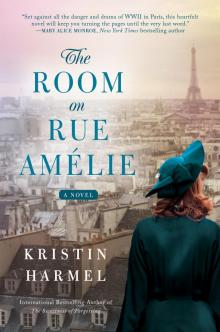 The Room on Rue Amélie
The Room on Rue Amélie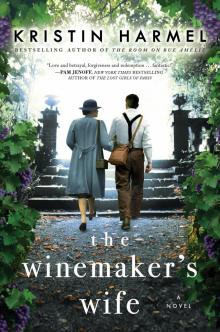 The Winemaker's Wife
The Winemaker's Wife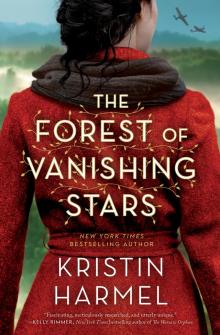 The Forest of Vanishing Stars
The Forest of Vanishing Stars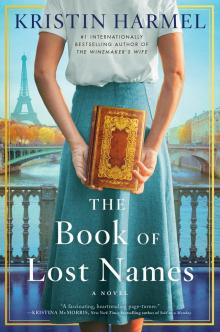 The Book of Lost Names
The Book of Lost Names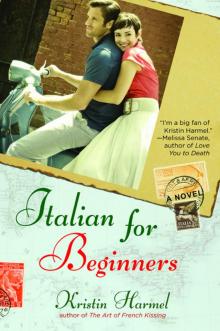 Italian for Beginners
Italian for Beginners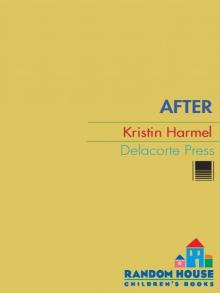 After
After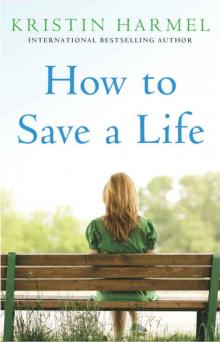 How to Save a Life
How to Save a Life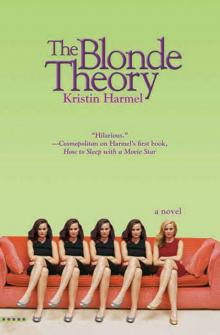 The Blonde Theory
The Blonde Theory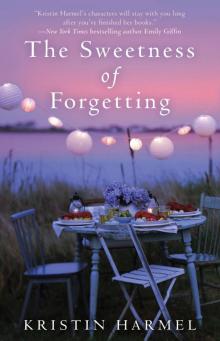 The Sweetness of Forgetting
The Sweetness of Forgetting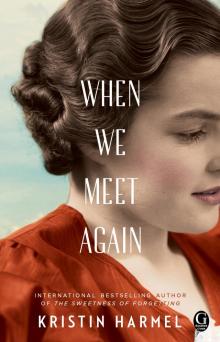 When We Meet Again
When We Meet Again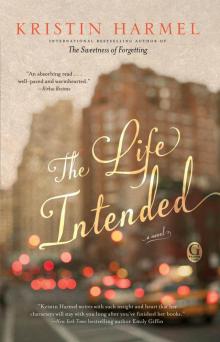 Life Intended (9781476754178)
Life Intended (9781476754178)